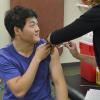Lisa Marshall
 CU Boulder Center for Sports Governance: Organizations governing U.S. Olympic sports could do better when it comes to transparency, checks and balances and democratic processes.
CU Boulder Center for Sports Governance: Organizations governing U.S. Olympic sports could do better when it comes to transparency, checks and balances and democratic processes. CU Boulder researchers have developed a potent, drug-like compound that could someday revolutionize treatment of rheumatoid arthritis and other autoimmune diseases.
CU Boulder researchers have developed a potent, drug-like compound that could someday revolutionize treatment of rheumatoid arthritis and other autoimmune diseases. Days after Shalane Flanagan won the NYC Marathon, CU Boulder researchers have published a study that inspired the name of the shoes she wore and confirms they reduce the amount of energy used to run.
Days after Shalane Flanagan won the NYC Marathon, CU Boulder researchers have published a study that inspired the name of the shoes she wore and confirms they reduce the amount of energy used to run. The influenza A virus kills 12,000 to 56,000 people in the U.S. annually, but a newly discovered mechanism by which the human immune system tries to battle the virus could lead to new treatments.
The influenza A virus kills 12,000 to 56,000 people in the U.S. annually, but a newly discovered mechanism by which the human immune system tries to battle the virus could lead to new treatments. With their brains, sleep patterns and eyes still developing, children and adolescents are particularly vulnerable to the sleep-disrupting effects of screen time. Watch a short video interview.
With their brains, sleep patterns and eyes still developing, children and adolescents are particularly vulnerable to the sleep-disrupting effects of screen time. Watch a short video interview. Researchers are studying 5,000 twins to paint a more accurate picture of how marijuana use changes as a result of legalization and how those changes may impact health in the long run.
Researchers are studying 5,000 twins to paint a more accurate picture of how marijuana use changes as a result of legalization and how those changes may impact health in the long run. Studies have long shown researchers publish prolifically in the first decade of their career, followed by a decline in productivity. But a CU Boulder study found that stereotype to be "remarkably inaccurate."
Studies have long shown researchers publish prolifically in the first decade of their career, followed by a decline in productivity. But a CU Boulder study found that stereotype to be "remarkably inaccurate." Professor Tiara Na'puti, a member of the indigenous Chamorro people of Guam, testified before a United Nations committee this week calling for its help in hastening decolonization of the beleaguered island.
Professor Tiara Na'puti, a member of the indigenous Chamorro people of Guam, testified before a United Nations committee this week calling for its help in hastening decolonization of the beleaguered island. The number of high schoolers playing American football grew steadily from 1998 to 2009 but then began a notable decline that's likely to continue, according to CU Boulder Professor Roger Pielke.
The number of high schoolers playing American football grew steadily from 1998 to 2009 but then began a notable decline that's likely to continue, according to CU Boulder Professor Roger Pielke. Negative sentiment about vaccines is alive and growing in social media, according to an expansive study designed to examine the prevalence and geographic clustering of online viewpoints.
Negative sentiment about vaccines is alive and growing in social media, according to an expansive study designed to examine the prevalence and geographic clustering of online viewpoints.


